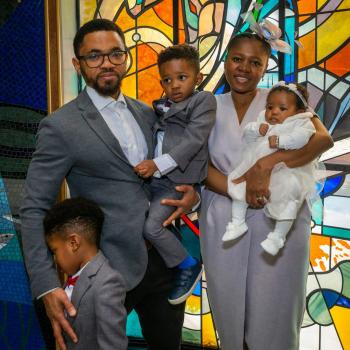Southern Baptist church autonomy (read: anarchy) causes problems for the ordination of ministers. They’re like, “No standards? No problem!”

Nobody likes to be told that they’re doing something wrong—but, SBC Churches, you’re doing ordination wrong! On my thirtieth anniversary of ordination, I’m reevaluating a few things that make Baptist ordination problematic.
Ordination’s Fallibility
If you haven’t already, I invite you to bookmark this page, and go read the first two articles in this three-part series. Then, return here when you’re done. Those articles are:
- In my article, “Am I Still a Minister? The Baptist Ordination Dilemma,” I tell the story of my own call to ministry, how I was licensed to preach, and the bumblings of my ordination council. Three decades have passed since then. Recently, a friend asked, “Are you still an ordained minister?” I hesitated. “Well, that’s a long story,” I said. Because Baptists make it complicated.” In today’s article, I’ll explain why it’s complicated.
- In my article, “Rethinking Ordination: Power, Purpose, and Problems,” I review the history of ordination in both the Jewish and Christian contexts. I discuss the many problems with ordination, and ask the question, “Do we need ordination at all?” While it may be a close race, I still believe that for Southern Baptists the benefits outweigh the drawbacks. But there is a lot of room for improvement.
A Problem of Polity
Southern Baptist polity creates a tremendous problem when it comes to licensing and ordaining ministers. Due to the doctrine of the autonomy of the local church, there is no centralized credentialing body, no uniform ordination process, and no ongoing evaluation of ministers.
The local church that licensed me to preach should have done so at the beginning of my time with them. After all, they called me the “youth pastor” the whole time I served there, even before they licensed me. If they had done it according to the recommended procedure, the pastor of the church would have mentored me for the entire eighteen months I was there. Yet, because there is no centralized standard or requirement for licensure, they were free to take it as flippantly as they wanted.
The local church that ordained me should have done so by organizing an examination board consisting of clergy from across our association. Yet, because there was no procedural requirement, my ordination council ended up being conducted by loving deacons who, through no fault of their own, had no idea what they were doing.
Autonomy Means Anarchy
Because each local church governs itself, in the Southern Baptist Convention, there is no denominational oversight or authority over ordination. Each church can do what it pleases. Therefore, it becomes extremely easy for each minister to do what they please as well. Autonomy means a lack of accountability. Autonomy means anarchy.
Abusive Pastors
This lack of accountability enables abusive pastors. If there’s a clergy scandal, autonomous churches often find it expedient to sweep offenses under the rug and cover up the abuse. If these are discovered, churches try to dismiss an errant minister as quietly as possible. They make the excuse that this saves the church and the pastor the bad press. Yet, it allows the miscreant minister the opportunity to simply find another autonomous church where they can repeat the abusive pattern. If the abusive pastor is canny enough, they can carry on this way for decades.
Pulpit Committees
Of course, pulpit committees (aka pastor search committees) bear some responsibility for following best practices. The problem is that while the denomination publishes good advice for these search teams there is no requirement for them to follow any of the guidance. Some churches conduct background checks on candidates. Others do not. Some receive resumes from denominational resources. Others employ the good-old-boy method: word of mouth from a friend of a friend. Simply put, there are no standards—and it’s no problem for most churches. Until it becomes a problem.
Possible Solutions
I would like to offer some recommendations for Southern Baptist churches, to balance the autonomy of the local church with a need for greater transparency and accountability. Here are four suggestions:
1. Centralized Database of Ordained Ministers
Databases? Of course, there are databases—of pastors who are looking for church employment. I remember filling out an application on my state convention’s employment database, years ago. Churches requesting resumes could filter based on certain criteria and get CVs from interested ministers. But this isn’t the kind of database I’m talking about.
The denomination should keep a file on each Southern Baptist minister, complete with education, resume, dates, and locations of licensure and ordination, history of churches they have served, and any allegations of misconduct made against them. To maintain consistency with the idea of autonomy, this participation could be voluntary but strongly encouraged. A minister who opted out would be hard-pressed to explain the omission to a pulpit committee. Unfortunately, a recent Christianity Today article reports that a proposed database that would do just that has been put on hold by the SBC.
2. Minimum Standards for Ordination
Southern Baptists have no particular education requirement for those seeking licensure and ordination. The feeling is that it’s God who calls you, not human beings—so who are we to place educational requirements on you? Ideally, an ordination council should examine the theological understanding of a candidate. But in reality, this interview has more to do with spiritual maturity and less to do with actual education.
Since each church autonomously calls its pastors, Baptists feel it’s up to the employing church to determine educational requirements for ministry candidates. Thus, the onus is on the church that calls a pastor to determine its educational requirements. It is not the responsibility of the licensing or ordaining church to require any particular theological education.
But what if there were minimal standards of theological education for Baptist ministers? It is not the purpose of this article to determine what that educational requirement ought to be. I’m not going to suggest that every Baptist pastor should have a D.Min., M.Div., or even a B.A. in religion. It isn’t for me to decide what the standard should be—but it ought to be important to the denomination that those leading their churches should know what they’re doing. Formal or informal, whatever the requirement is, there should be some minimal expectation of pre-ordination education and then continuing ed to maintain ordination.
3. Term Limit on Ordination
I understand why my friend asked me if I’m still ordained. In most other denominations, ordination is not necessarily for life. You have to keep up your credentials through participation in the denomination, through continuing education, or through financially contributing to the denomination or its ministries.
But in the Southern Baptist Convention, you continue to be ordained unless you do something to get defrocked. And in thirty years of ordination, I’ve never heard of a Southern Baptist pastor losing their credentials. How would that happen, anyway? The Southern Baptist Convention doesn’t hold my ordination. Maybe the church that ordained me could vote to revoke my ordination, but there’s really no rule for that. As long as I have the certificate of ordination, I’m ordained. That’s the way it works.
I suggest that this isn’t the healthiest way to approach the ministry. The denomination should create term limits on ordination. During that time, continuing education should be required. Perhaps there could be an evaluation, say every five years. If an ordained minister no longer meets educational, theological, ethical, or ministerial standards, that ordination could be revoked.
4. Clergy Accountability and Parish Relations
Besides education, background checks should be mandatory before ordination, and at regular intervals throughout the pastor’s ministry. Good behavior shouldn’t just be something a minister evidences before ordination; they should maintain it throughout their tenure.
To ensure that clergy are kept accountable, the SBC should maintain an office of clergy accountability and parish relations. This office would assist churches seeking pastors and help pastors seeking churches. It would maintain the clergy database, handle allegations of misconduct, ensure continuing education, and conduct regular background checks. It would also assist churches with reference verification as they review resumes. In addition, this office would handle allegations of congregations abusing their pastors—because that certainly happens as well. The office of clergy accountability and parish relations would serve as a liaison between ministers and congregations, to ensure the vetting of pastors and churches alike. It should do this while respecting the autonomy of the local church.
Accountable for Lack of Accountability
In recent years, Southern Baptist churches and pastors have been held accountable for their lack of accountability. While autonomy is a core Baptist value, the lack of accountability the denomination has evidenced threatens to erode its witness, damage its reputation, and harm the lives of millions of Christians. Healthy churches and pastors should not shy away from measures of shared responsibility. Instead, they should answer the call to integrity and safety. In this way, the SBC can claim to be Good News people.
Am I Still a Minister?
So, what’s my answer to the friend who asked if I’m still a minister? Yes—because Southern Baptists ordain a person for life, and the church that laid hands on me hasn’t revoked my credentials. I don’t agree with the fact that they ordain a person for life, but the fact is that, for now, they do. So, even though I haven’t attended a Baptist church in years, I’m still an ordained Baptist minister.
Of course, after reading this article, they just might want to revoke my ordination. And I’m okay with it. If ordination is that important to me, I can seek it elsewhere. And if it isn’t, then I won’t. But whatever the outcome is for me, I think it will be better for pastors, churches, and the denomination that reads these words. Because when it comes to Baptist ordination, it shouldn’t be a matter of “No standards? No problem!”


















